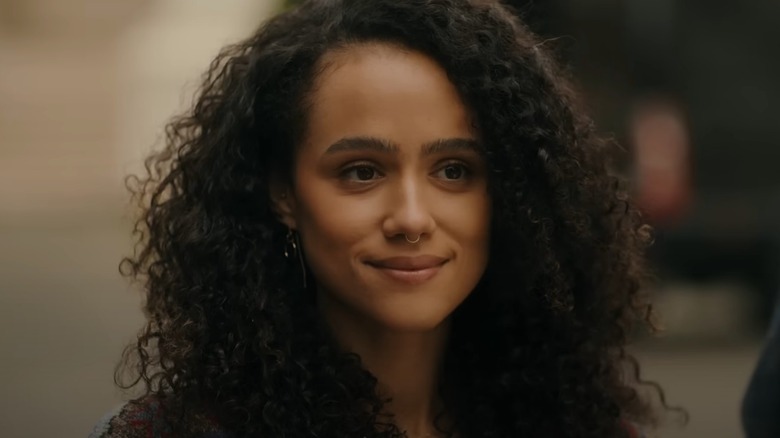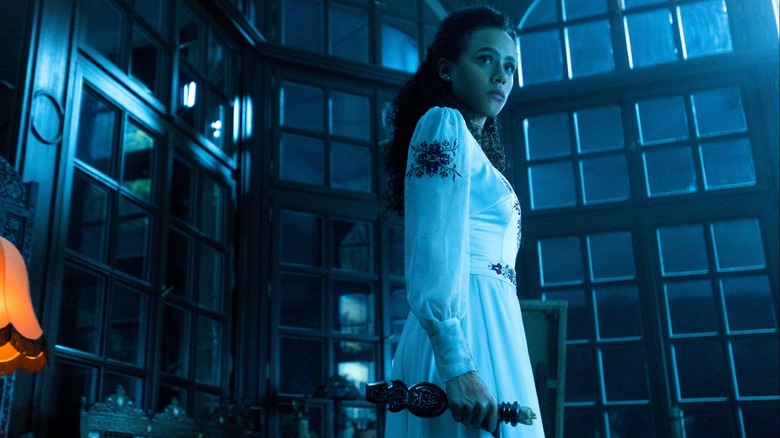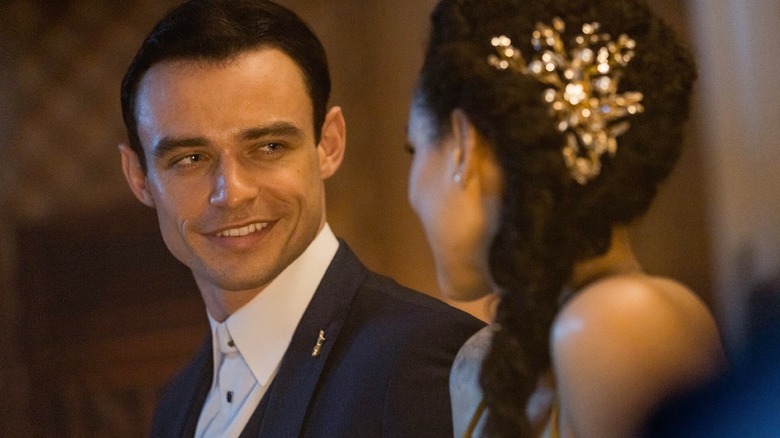The Invitation Review: Whites Only Wedding
- Nathalie Emmanuel makes for a captivating lead
- The movie is terribly paced
- Its score is so boilerplate as to border on parody
- The twist it all hinges on feels too telegraphed to be in any way revelatory
Not to be confused with the 2015 Karyn Kusama picture of the same name, "The Invitation" is also about a worst-case scenario for getting persuaded into attending a social event. But where that film was purposeful, meditative, and properly suspenseful, this one is decidedly not. Director Jessica M. Thompson, the helmer behind the well-received indie drama "The Light of the Moon" puts her all into this, her first studio picture, but no amount of grace or care can elevate the middling script from G4 TV vet Blair Butler. This is a movie that must have seemed novel on paper, but in execution feels too rote to have any real impact.
From the outset, it's a movie blatantly heading in an obvious direction, but somehow, "The Invitation" feels self-satisfied with the rug it pulls from under the viewer as if there could conceivably be anyone in the audience not staring at their feet waiting for the fall. "Game of Thrones" and "Fast" saga veteran Nathalie Emmanuel stars as a grieving young woman whose search for family leads her across the pond to a mysterious gothic wedding that is not what it appears to be.
That's the tagline, anyway. It's exactly what it appears to be, and the fact that it takes so long to get there feels like a unique brand of torture.
Kissing cousins
The film begins with Evie (Emmanuel), a woman living in NYC and mourning the recent death of her mother. She already lost her father at a young age, leaving her feeling untethered and longing for a sense of belonging. Lucky then that her job as a server has her working a gala event run by a 23andme stand-in, leading her to use the service to seek out some genetic elucidation. In addition to the easy set-up for the film's main plot, getting a glimpse of Evie at work doubles as an opening salvo for some of the themes at play here. She is a struggling artist who must debase herself for money when surrounded by crusty upper-class maniacs who don't see her as human.
The results come back and Evie turns out to have a long-lost cousin, Oliver (Hugh Skinner), who tells her of her sordid connection to his bloodline. Generations ago, Evie's great-great-grandfather was a Black servant who had an affair with the lady of the house before spiriting away with the baby and raising her on his own. Oliver paints it as a cutesy scandal, underscored by Emmanuel's passing resemblance to Meghan Markle, but offers her an invitation to a wedding much of their family will be at. She obliges, of course, and we're introduced to a whole host of forgettable, broadly drawn caricatures of English aristocracy, each more cardboard cutout than the last. Evie encounters microaggression after microaggression while beginning a burgeoning flirtation with the lord of the manor, Walter (Thomas Doherty), a man she is reassured she shares no blood relation with.
This "Downton Abbey"-like dalliance continues on for what feels like eons, interspersed with just enough reminders that "there is something afoot" to try to keep viewers promised a horror film from walking towards the exit. The film's prologue, taking place in Walter's manor at some unknown juncture in the past, sets the tone firmly enough that whatever mystery lurking about this enormous castle must be something harrowing. But it doesn't feel as intriguing or engaging as it should.
There are numerous allusions to a particularly famous horror novel in the public domain, one conveniently not credited in a "based on" manner one must assume for shock factor, but otherwise, there's just this ongoing dance between the tense thriller "The Invitation" imagines itself to be and the boring, glacially paced, crummily written waste it actually is. No amount of cutting to the butler (Sean Pertwee) nefariously suggesting the female help go dust empty rooms filled with portent can change that.
Unfortunately, it doesn't get any better once the laborious "twist" is revealed and the band-aid gets ripped off this open wound of a motion picture. Spoilers in the next slide for "The Invitation"!
Looking for a third
Evie's growing comfort with Walter is matched only by her increasing suspicion that something is amiss with the other guests in town for this wedding. For instance, where is the bride? Why do these two women (Stephanie Corneliussen and Alana Boden) have such antagonistic energy towards her? Once Walter's joking proposal to Evie rapidly turns into a real thing, all is revealed: Walter is not who he says he is. In fact, he's a very famous, very well-known horror fiction figure, the sort to usually have movies about him named after him.
This instantly recognizable name is never spoken aloud, only broadly gestured to with heavy implication. But that sort of approach to the mythology at the heart of the film, perhaps meant to prolong an inevitable surprise, is part and parcel of why the film doesn't work. It's clear Butler's script wanted to modernize an element of a popular piece of vampire mythology, positioning Evie as the reluctant third bride of He Who Isn't Named, but there's nothing here, not even with the director's rewrites, that elevates this finished product above neat elevator pitch. The same way the film carefully tiptoes around the Count, it artfully dodges making any meaningful or resonant commentary about any of the myriad touchstones it tosses out so carelessly.
A key change from the original script Thompson brought was the decision to make Evie a woman of color, a change she felt strongly about for the story they were telling. But while Emmanuel's skin tone lends a sort of credence to the film's many instances of implied racism and classism, it feels like it's used like bait, a surface-level stylistic choice designed to imply a thematic depth the filmmakers do not possess, at least not within this otherwise kitschy and on the nose genre effort.
The narrative is thornier than this, but at times "The Invitation" feels like someone wrote, "what if Prince Harry was a vampire" on a whiteboard and called it a day. Vampire movies deserve more than this. So do ruminations on how gender and race and class intersect with outdated oppressive systems. It's just a shame everyone involved with "The Invitation" seemed so content with whatever the hell this is.


